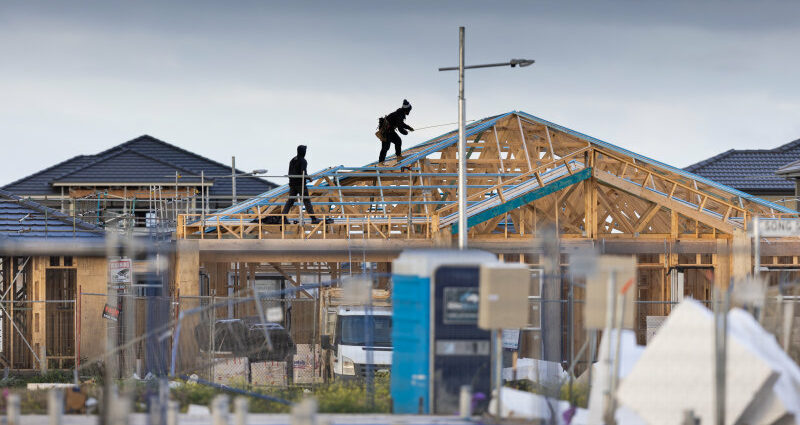Save articles for later
Add articles to your saved list and come back to them any time.
The bank of mum and dad is increasingly becoming a key driver of home ownership, with those who receive help from their parents – whether money for the deposit or living rent-free in the family home – almost twice as likely to own a house than those who receive no assistance.
The importance of family support has been highlighted by researchers from the universities of Sydney, NSW, RMIT and Curtin in a report on the financing of first home ownership, funded by the Australian Housing and Urban Research Institute.
“Family help and assistance is particularly important in markets like Sydney and Melbourne,” says Stephen Whelan, a University of Sydney professor of economics and the report’s lead author.
Those helped by their parents are almost twice as likely to get into the property market than those who receive no help.
He says the children of wealthier parents are more likely to enter into home ownership with the benefits that home ownership brings over the life cycle, with those who are not as fortunate potentially locked out of the housing market.
“It has the potential to increase wealth inequality over time,” Whelan says.
The report finds home ownership rates among 25 to 34-year-olds have declined by more than one-quarter since 1981.
“Relative to older generations, younger cohorts who have experienced lower rates of homeownership close only three-quarters of the gap by age 50–54 years. This points to a systemic decline in home ownership rates that will increasingly be evident as cohorts age,” the report says.
Whelan says most policy settings are likely to have exacerbated rather than alleviated the challenge faced by first home buyers.
“Politically seductive measures, such as first home owner grants and tax concessions, have failed to arrest the declining rates of home ownership over time,” he says.
These incentives tend to push dwelling prices higher, he says. “When these sweeteners are announced, the market moves pretty quickly, firstly at the lower end [of prices], before permeating to the rest of the market, benefitting existing home owners,” Whelan says.
A centrepiece of Anthony Albanese’s campaign launch was Labor’s Help to Buy scheme.Credit: Alex Ellenghausen
Low deposit schemes can help first home buyers into the market, while shared equity schemes can also help, though the numbers of planned new dwellings are “pretty modest”, Whelan says.
The Albanese government’s Help to Buy scheme is expected to assist 40,000 first home buyers and those who have previously owned a property over the next four years. They will probably need a deposit of only 2 per cent.
Under the scheme, the federal government buys up to 30 per cent of an existing property, and up to 40 per cent on a new build, with the buyer owning the rest.
There are purchase price caps, depending on the location of the property as well as salary limits. Each state and territory will have to legislate for the scheme, which is expected to come into effect next year.
The Albanese government has also increased the target to build new homes from 1 million to 1.2 million over the next five years, starting from the middle of next year, where financial incentives are offered to the states and territories.
The federal government also has programs to increase the number of affordable rental homes. There are also schemes that help first home buyers and others who find it difficult to save a deposit.
The National Housing Finance and Investment Corporation administers three low-deposit home purchase guarantees through which qualifying home buyers pay a deposit of only 5 per cent, or 2 per cent, depending on the guarantee.
Applications for guarantees can be made directly with participating lenders, or through mortgage brokers.
Borrowers should think carefully before accessing a low-deposit scheme, says Peter Marshall, the banking and rates expert at comparison site Mozo.
The mortgages available to those with small deposits tend to have higher interest rates than those available to people who buy with a larger deposit, he says.
The smaller the deposit, the easier it is to fall into “negative equity” where, if property prices were to drop, the mortgage could be worth more than the property, Marshall says.
Some experts have warned that first home buyers who have received parental assistance for a deposit can be more likely to fall behind on repayments, or to default, as they have not experienced the financial discipline of saving for the deposit themselves.
- Advice given in this article is general in nature and is not intended to influence readers’ decisions about investing or financial products. They should always seek their own professional advice that takes into account their own personal circumstances before making any financial decisions.
Expert tips on how to save, invest and make the most of your money delivered to your inbox every Sunday. Sign up here for our Real Money newsletter.
Most Viewed in Money
From our partners
Source: Read Full Article
-
U.S. Job Growth Slows Roughly In Line With Estimates In March
-
U.S. Housing Starts Decrease In November, Building Permits Plunge
-
Young Australians feeling more hopeless amid cost of living crunch
-
Push for UniSuper to develop ‘coherent’ climate strategy
-
Six tips to beat the cost of living crunch (and one for saving on toilet paper)



